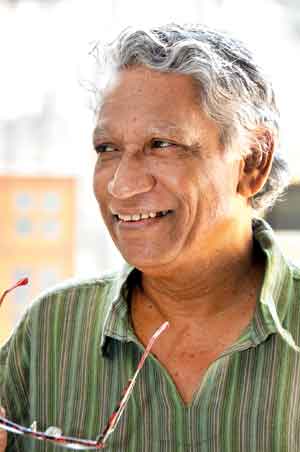Pathi, the silent doer is no more
View(s):
Dharmasena Pathiraja
I had just finished reading the article by Rajitha Weerakoon in the Sunday Times last week on a felicitation to Dharmasena Pathiraja (‘Pathi’ as we always called him). My friend Buddhi Galappatti had just then had a cleverly drafted message on his Facebook in Sinhala. Translated into English it read: ‘Pathi, you are now on your own in the distant skies. Thousands of stars will keep you company. Good night, Pathi.’ (The reference to the distant skies was about Pathi’s cinematic creation ‘Ahas Gawwa’, his first feature film). Pathi had said goodbye.
Much has been written during the last week about Pathi and his contribution to Sri Lankan cinema. Pathi’s last public appearance was in June last year. It was at ‘Pathita Panahai’ organised on the initiative of the then Director-General of Information, Ranga Kalansooriya to acknowledge Pathi’s effort to make Sinhala films more meaningful and authentic.
In the short speech he gave at the felicitation, he made a few observations. One exposed the standard of journalism today: “I got a telephone call a few days back. The caller asked me ‘Hello, is that Dharmasena’. I was a bit hesitant to give a reply. Naming the FM channel he said he was calling from, he asked, ‘Haven’t you completed fifty years?’ Again I was hesitant to answer. I should have said ‘Yes – twenty five years back’.”
This obviously led him to think whether he could be called a professional filmmaker. “I don’t consider myself as one,” he said. He confessed that he never earned his living by making films though the producers did pay him for his services. “I was a university lecturer from the time I joined the Vidyalankara (now Kelaniya) University in 1968 until my retirement from the Colombo University in 2008.”
To him filmmaking in Sri Lanka was not a professional industry. But there are many who are into filmmaking. He has seen a lot of capable, talented young men who are keen to become filmmakers. He made a request from the President who was present at the ceremony. “The government must intervene and provide them with capital and infrastructure facilities.”
On a personal note he said that this was the first time he was attending a function of this nature. “I have never celebrated my birthday,” he said.
Cutting his teeth first as a script-writer helping Sugathapala Senerat Yapa in ‘Hantane Kathawa’ based on university life in Peradeniya (Pathi himself did his first degree there), he tried his hand at film direction with ‘Ahas Gawwa’ in 1974. Unemployment and the difficulty to find a job was the theme of the film. Encouraged by the success of the film and with his left leanings, Pathi made social issues the theme of his films. He read and absorbed a lot. He was influenced by the writings of contemporary radical filmmakers and other writers.
Having embraced filmmaking, Pathi made it his subject for post-graduate studies. For his PhD at Monash University, Australia his thesis was on Bengali cinema. He valued his stint at the Jaffna University where he was able to form a film society and to make a film in Tamil, ‘Ponmani’ (1978) – the first and only Tamil film to be made by a Sinhala film director.
His early films saw lesser known actors Wimal Kumar de Costa, Amarasiri Kalansuriya, Daya Tennakoon and Vijaya Kumaranatunga showing their skills under Pathi’s direction. Even Malini Fonseka blossomed in his films and won an award for her performance in ‘Eya Den Loku Lamayek’ (1975) at the Moscow Film Festival. Pathi himself won a special award from the Peace Council of USSR.
Veteran Joe Abeywickrema’s acting in ‘Bambaru Avith’ (1978) and ‘Soldadu Unnehe’ (1981) was much talked about. In the latter Henry Jayasena too showed his talent on screen. Both films won awards at the Presidential Awards with the latter bagging several OCIC awards.
Almost all his early films were screened at foreign festivals.
Pathi did not forget the small screen. He produced over ten tele-dramas. The award-winning ‘Kadulla’ (1992) was applauded by everyone.
The drama he wrote, ‘Kora Saha Andhaya’ produced by Dhamma Jagoda had just three players – Wimal Kumar de Costa, Daya Tennekoon and Malini Weeramuni – and was well received.
Among his numerous lyrical creations, ‘Udumbara’, the theme song in ‘Bambaru Avith’ (sung by T.M.Jayaratne/Ivor Dennis/Sunil Abeysekera) and ‘Hemin Sere Piya Vida’ in Dharmasiri Bandaranayake’s ‘HansaVilak’ (TM and Sunil) – both maestro Premaasiri Khemadasa’s compositions – have remained extremely popular for several decades.
Pathi is no more but his role in taking Sri Lankan cinema in the right direction in the 1970s and ‘80s will be remembered forever.
D.C. Ranatunga


